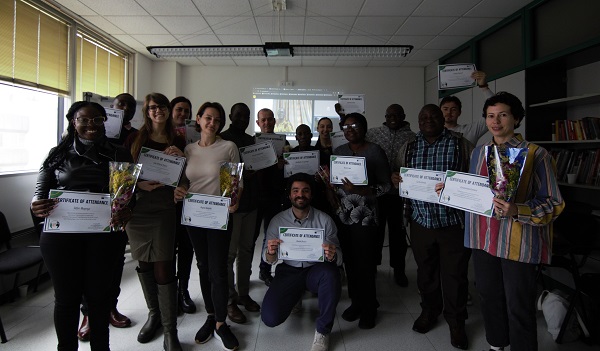
The GEAVET project is a comprehensive initiative aimed at addressing the challenges of climate change and the mismatch between job requirements and the skills provided by the education and vocational training systems in a specific context, namely that of Vocational and Educational Training systems in the field of Agriculture in Sub-Saharan Africa.
Coherently, the project aims to enhance VET providers’ capacities in this field, improve their response to climate change challenges, and boost the labor market relevance of skill provision.
The project emphasizes the need for a Green Transition in vocational education in Kenya, Nigeria, Uganda, and Mozambique, and advocates for a shift from subsistence farming to climate-smart, nature-positive income and job-generating activity. The project plans to achieve its objectives through a state-of-the-art analysis of vocational training best practices in sustainable agriculture and pedagogical approaches beneficial for the environment in EU countries and through plans for spreading this knowledge and know-how directly to the beneficiaries, namely all the potentially interested stakeholders, especially at the local level.
Key activities of the project’s action plan are the development of a training programme to increase the sustainability and green transition competences of small-holder farmers, the design of an ICT-based coaching programme to address the needs of women farmers in farm modernisation, innovation, and market orientation.
In order to be a tool for boosting local Sub-Saharan entrepreneurship, the project involves phases of establishment of working groups composed by VET institutions, private sector companies, and women farmers for the design of the VET programme, and phases of international exchange activities for VET staff to foster mutual learning.
The project also unfolds targeted dissemination activities throughout the work packages, spanning from the project’s start to its conclusion. These communication campaigns are directed towards climate change mitigation and adaptation, biodiversity, and involve active participation in green transition from the private sector.
Project general
Objectives
Address major challenges in the Sub-Saharan countries involved in the Project, promoting inclusive and green economic growth, as well as the protection and restoration of biodiversity, addressing climate change, boosting digital transition, and searching solutions for food security, youth unemployment, and gender inequality.
Address one key sector in Sub-Saharan countries - Food and Agriculture - by promoting sustainable agriculture to boost resilience needed to face climate change-related challenges, to increase productivity, and to create (green) job opportunities, especially for youth and women.
Mitigate the impact of climate change on agriculture in Africa by contributing the development of climate-smart agricultural practices for the movement from subsistence farming to nature-positive income-generating activities.
Build adaptation capacity in agriculture, to contribute to the transition to a resilient society overall, by addressing priorities for climate change adaptation and mitigation
Align with local, regional, and national development strategies, as well as European ones, such as “EU Farm to Fork” and “EU Biodiversity” Strategies, with the aim to boost inclusive and green economic growth with a focus on agriculture to achieve sustainable conservation of the environment and natural resources, to address climate change and food insecurity while transitioning to a green and digital economy that will create jobs for women and youth.
Contribute to the improvement of responsiveness of VET to economic and social developments to enhance the labor market relevance of skills provision, with a focus on the skills for green transition, in order to tackle the mismatch between labor supply and demand.
Push to create businesses by fostering entrepreneurship education.
Increase awareness and knowledge of sustainable agriculture practices and their importance for economic development, environmental sustainability, and social inclusion, in order to disincentivize and dismantle popular inefficient and unsustainable agriculture practices and to reverse environment and ecosystems degradation.
Specific Objectives
Increase sustainability competences of small-holder farmers on climate-friendly farming methods, climate-resilient crop varieties and livestock species, pest management and long-term benefit of going the organic way, risk management and appropriate preventive actions to address natural disasters, catastrophic events and animal and plant diseases through the development of a training programme for CSA.
Support the transformation of the agricultural sector towards more sustainable food systems, livelihoods and production patterns, for a stronger and more inclusive economic growth, built on practices which are climate resilient and preserves biodiversity.
Act for an appropriate alignment of education providers to the agricultural sector in order to address the persistent mismatch between job requirements and skills offered by the education and vocational training systems, by providing market-oriented technical and vocational education and training (TVET) programs.
Establishment of working groups of VET institutions, private sector companies and youth for the design of VET programmes that also include peer-to-peer learning in mobility activities.
Empower TVET providers as links between learners and markets, equipping them with the capacity to fill the market gaps also by using digital means as both instruments for creating connections and teaching/learning tools.
Address the needs of women in farm modernization, innovation and market orientation.
Reinforce the capacities of VET providers to engage with business associations and enterprises in the agricultural sector, strengthening networking across countries and regions, and public-private synergies.
Develop climate-smart agronomic and agro-ecological techniques and entrepreneurship education to create employment opportunities.
Promote innovation, technology, and knowledge transfer among actors in agriculture.
Enhance entrepreneurship education, especially among women and youth.
Uganda Youth Skills Training Organisation.
150 meters off Kasubi tombs street, behind kasubi St Andrews Church of Uganda +256 776 830887